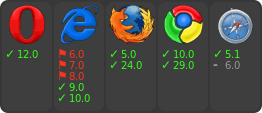readme.markdown #1
minimist
parse argument options
This module is the guts of optimist's argument parser without all the fanciful decoration.
example
var argv = require('minimist')(process.argv.slice(2));
console.dir(argv);$ node example/parse.js -a beep -b boop
{ _: [], a: 'beep', b: 'boop' }$ node example/parse.js -x 3 -y 4 -n5 -abc --beep=boop foo bar baz
{ _: [ 'foo', 'bar', 'baz' ],
x: 3,
y: 4,
n: 5,
a: true,
b: true,
c: true,
beep: 'boop' }methods
var parseArgs = require('minimist')var argv = parseArgs(args, opts={})
Return an argument object argv populated with the array arguments from args.
argv._ contains all the arguments that didn't have an option associated with
them.
Numeric-looking arguments will be returned as numbers unless opts.string or
opts.boolean is set for that argument name.
Any arguments after '--' will not be parsed and will end up in argv._.
options can be:
opts.string- a string or array of strings argument names to always treat as stringsopts.boolean- a boolean, string or array of strings to always treat as booleans. iftruewill treat all double hyphenated arguments without equal signs as boolean (e.g. affects--foo, not-for--foo=bar)opts.alias- an object mapping string names to strings or arrays of string argument names to use as aliasesopts.default- an object mapping string argument names to default valuesopts.stopEarly- when true, populateargv._with everything after the first non-optionopts['--']- when true, populateargv._with everything before the--andargv['--']with everything after the--. Here's an example:opts.unknown- a function which is invoked with a command line parameter not defined in theoptsconfiguration object. If the function returnsfalse, the unknown option is not added toargv.
> require('./')('one two three -- four five --six'.split(' '), { '--': true })
{ _: [ 'one', 'two', 'three' ],
'--': [ 'four', 'five', '--six' ] }Note that with opts['--'] set, parsing for arguments still stops after the
--.
install
With npm do:
npm install minimistlicense
MIT
# minimist
parse argument options
This module is the guts of optimist's argument parser without all the
fanciful decoration.
[](http://ci.testling.com/substack/minimist)
[](http://travis-ci.org/substack/minimist)
# example
``` js
var argv = require('minimist')(process.argv.slice(2));
console.dir(argv);
```
```
$ node example/parse.js -a beep -b boop
{ _: [], a: 'beep', b: 'boop' }
```
```
$ node example/parse.js -x 3 -y 4 -n5 -abc --beep=boop foo bar baz
{ _: [ 'foo', 'bar', 'baz' ],
x: 3,
y: 4,
n: 5,
a: true,
b: true,
c: true,
beep: 'boop' }
```
# methods
``` js
var parseArgs = require('minimist')
```
## var argv = parseArgs(args, opts={})
Return an argument object `argv` populated with the array arguments from `args`.
`argv._` contains all the arguments that didn't have an option associated with
them.
Numeric-looking arguments will be returned as numbers unless `opts.string` or
`opts.boolean` is set for that argument name.
Any arguments after `'--'` will not be parsed and will end up in `argv._`.
options can be:
* `opts.string` - a string or array of strings argument names to always treat as
strings
* `opts.boolean` - a boolean, string or array of strings to always treat as
booleans. if `true` will treat all double hyphenated arguments without equal signs
as boolean (e.g. affects `--foo`, not `-f` or `--foo=bar`)
* `opts.alias` - an object mapping string names to strings or arrays of string
argument names to use as aliases
* `opts.default` - an object mapping string argument names to default values
* `opts.stopEarly` - when true, populate `argv._` with everything after the
first non-option
* `opts['--']` - when true, populate `argv._` with everything before the `--`
and `argv['--']` with everything after the `--`. Here's an example:
* `opts.unknown` - a function which is invoked with a command line parameter not
defined in the `opts` configuration object. If the function returns `false`, the
unknown option is not added to `argv`.
```
> require('./')('one two three -- four five --six'.split(' '), { '--': true })
{ _: [ 'one', 'two', 'three' ],
'--': [ 'four', 'five', '--six' ] }
```
Note that with `opts['--']` set, parsing for arguments still stops after the
`--`.
# install
With [npm](https://npmjs.org) do:
```
npm install minimist
```
# license
MIT
| # | Change | User | Description | Committed | |
|---|---|---|---|---|---|
| #1 | 19553 | swellard | Move and rename clients | ||
| //guest/perforce_software/helix-web-services/main/source/clients/2016.1.0/javascript/node_modules/minimist/readme.markdown | |||||
| #1 | 18810 | tjuricek |
First-pass at JavaScript client SDK. JavaScript requires Node with Gulp to "browserfy" the library. It's the easiest way I found to use the swagger-js project; bundle up a wrapping method. There is no JavaScript reference guide. The swagger-js doesn't really document what they do very well, actually. Overall I'm not particularly impressed by swagger-js, it was hard to even figure out what the right method syntax was. We may want to invest time in doing it better. This required setting CORS response headers, which are currently defaulted to a fairly insecure setting. |
||

